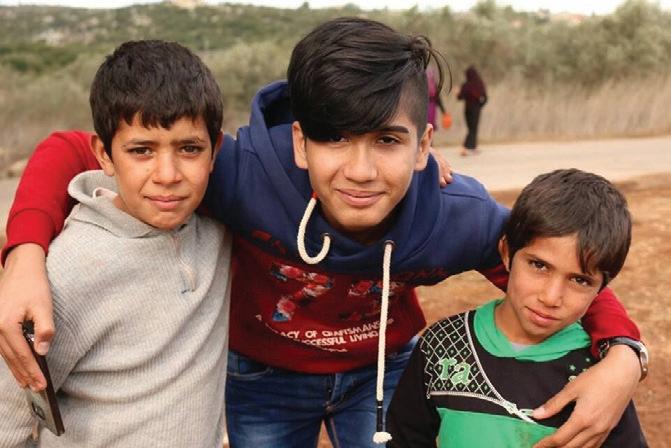
3 minute read
The Refugees’ Mite
“She whispered to me that for a few hours, we had made them forget their circumstances.”
Twenty-seven Syrian refugee students and a few faculty members from the Adventist Learning Center (ALC) in Beirut piled into a tiny, rented bus. They were on their way to deliver sacks of clothing and food to refugees camping north of the city.
Their adventure was the result of a challenge presented to them by the ALC staff. Every year, people from around the world send donations to help provide for the students’ needs. Would the students like to help someone else now as a means of expressing their gratitude? The unanimous answer was yes!

Saying goodbye to new friends.
The students immediately began asking friends and neighbors for donations. Then they dug into the limited supply of items that were meant for their own needs. One by one, they filled more than 30 large sacks with necessities such as winter jackets, rain boots, and shoes.
“Many of these students come from very poor homes without proper doors, windows, and walls,” says Alexis Hurd-Shires, ALC director. “Their parents are either unemployed or don’t have a steady source of income so sometimes they can’t pay the rent, buy proper clothing, or put food on the table. We think it’s important to give the kids a chance to give back, but we make sure their needs are met too.”

The ALC children helped the refugees start a fire.
This gesture of self-sacrifice from the refugee children touched Rick McEdward, president of the Middle East and North Africa Union Mission. “Sometimes I’m struck with how many times we share what we have at no sacrifice while others share what they need at great sacrifice,” he said. “The generosity of these kids is amazing.”
Finally, the little bus pulled into the refugee camp. The students, familiar with want and suffering, were shocked by what they saw. Children ran along the frozen ground with no shoes. Their homes, flimsy tents crumbling under the weight of rain, leaked icy water. Parents wearing thin, ragged clothing bore the brunt of bitter winds as they went about their daily tasks.

A refugee child at the camp.
Moved with compassion, the students quickly distributed the food and clothing. Some of them visited the families in their tents while others started a game of football with the children under a nearby olive grove. They were sad to learn how long it had been since the young ones had seen a ball.
Some of the ALC students found a teenage girl trying to build a fire to heat water to wash clothes. They hunted for more wood and then helped her start a fire under her metal pot.

Inside one of the refugee tents.
Ten-year-old Mohammad noted that there was no running water in the camp, no carpets on the floors, and no school for the children to attend.
Finally, the ALC group had to leave, and everyone gathered in a muddy field to say goodbye. “One older woman gave us the sweetest gift,” says Hurd-Shires. “She whispered to me that for a few hours, we had made them forget their circumstances.”
This story was shared with Mission 360° by the Middle East and North Africa Union Mission.
Urban Centers of Influence (UCIs)
More than 100 years ago, Ellen White championed an outreach model that she called centers of influence: small platforms for launching Christ’s method of ministry and connecting to city communities.
Global Mission has helped to establish more than 45 UCIs, and many more are in the planning stages. To learn more about UCIs, please visit UrbanCenters.org and MissionToTheCities.org.
UCIs
~minister to people’s needs, lead people to Jesus, and plant new groups of believers.
~present an ideal opportunity for Total Member Involvement in outreach that suits each person’s gifts and passions.
~are staffed by local Adventist workers, Global Mission pioneers, and volunteers who partner with church ministry departments, institutions, and lay organizations.
~are designed to become self-sustaining.










